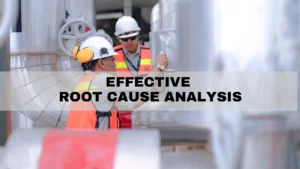Root cause analysis and root cause failure analysis are commonly used terms. I have always felt that these terms are somewhat misguided.
First, there is not really such a thing as a “root cause” to a problem.
If you’re looking for a root cause definition, you will find a mix of homegrown attempts, but all of them are general or unclear in nature. Here is an example definition: “A root cause is an initiating cause of a causal chain which leads to an outcome or effect of interest”.
Aside from being wrong, it is quite a word salad of nonsense. The problem with definitions like these is that it is never, in the real world, possible to prove a single event that solely initiates a whole chain of other events.
This is because there are always other events before the so-called “root cause event”. This may seem like semantics, but for problem-solvers, it is important to keep in mind that there never is a silver-bullet answer.
Second, is finding the underlying cause really that important?
In my opinion, the process should be used to implement solutions.
That is the whole idea, isn’t it? – to find and implement SOLUTIONS! If we think logically in reverse and ask, “Do we always have to know the root to find great solutions?” Absolutely not!
A root cause example in manufacturing
A plant has problems with failing bearings in most of its rotating equipment. After a quick look, we find out that equipment isn’t aligned; there are no lubrication routes set up, no clean oil storage, and no sealed storage for spare bearings.

Learn the proper way to store bearings.
Many people that get excited in doing these investigations become too detailed oriented and lose sight of the big picture and the economics of things.
So, in summary, focus more on implementing solutions based on a practical investigations and not getting to the root.
IDCON calls our method Root Cause Problem Elimination™ (RCPE) to shift the focus towards implementation of solutions rather than just analysis. Learn more about IDCON’s consulting and training in RCPE.




